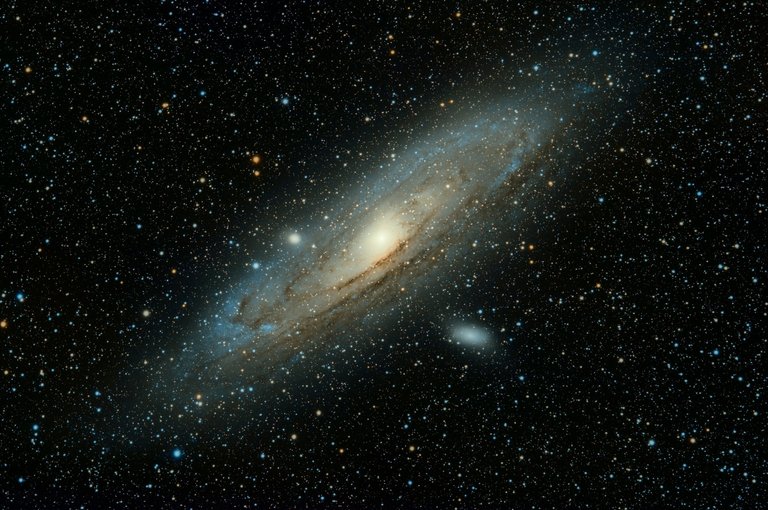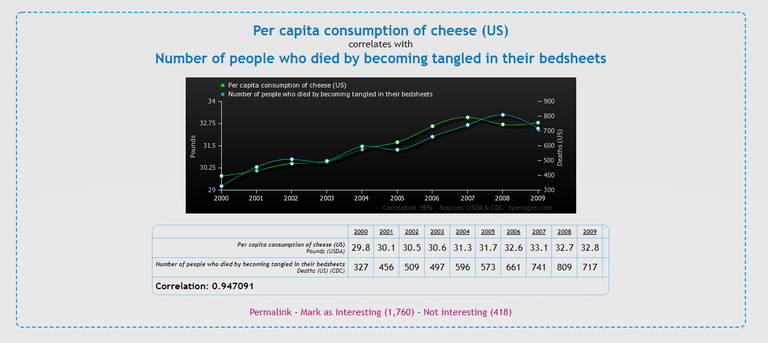Synchonicity (IFC Finals S2R1)

This is my entry for the Information Finding Championship Season 2 finals hosted by @ifc and @apolymask.
After a long hiatus, the IFC is back with the topic of "Synchronicity". Unfortunately, as this is a concept that is completely unknown to me... I had to go and look up what the word actually meant! I had a suspicion about what it could mean, and it appears that I wasn't too far off. After all, the it has a similar sort of construction to the word "Synchronous", which is much much more familiar to my mind!
So, a quick trip to everyone's favourite online encyclopaedia to get an incredibly shallow understanding of the concept and the word. Here is some of the extract from the beginning....
Synchronicity (German: Synchronizität) is a concept, first introduced by analytical psychologist Carl Jung, which holds that events are "meaningful coincidences" if they occur with no causal relationship yet seem to be meaningfully related.
During his career, Jung furnished several different definitions of the term, defining synchronicity as an "acausal connecting (togetherness) principle;" "meaningful coincidence;" "acausal parallelism;" and as a "meaningful coincidence of two or more events where something other than the probability of chance is involved."
Jung's belief was that, just as events may be connected by causality, they may also be connected by meaning. Events connected by meaning need not have an explanation in terms of causality, which does not generally contradict universal causation but in specific cases can lead to prematurely giving up causal explanation.
As it is neither testable or falsifiable (see: scientific method), synchronicity does not fall into the realm of empirical study. Main objection from scientific standpoint is that synchronistic events are experimentally indistinguishable from ordinary coincidences.
So, on the surface... it appears that it appears to be that the concept of Synchronicity is the attachment of meaning or purpose to otherwise apparently unrelated events. This meant that certain events appear to be linked because the chances of them happening seem to be beyond the realm of probability. Using this concept, Jung appears to have argued for the existence of the paranormal.
In the last line of the Wikipedia blurb, is the objection from a rational or scientific point of view. For those who have followed my blog... it will be no surprise at all that this is the part that appeals more to my way of thinking.
Stuff happens
In non-trivial systems, outcomes and events have multiple inputs and multiple outcomes. The more complex the system, the more tangled the relationship between cause and effect. Unfortunately, our minds are hard-wired to not think in terms of this sort of fuzzy probabilistic manner, but is much more geared towards a simple cause and effect sort of analysis. There is nothing wrong with that, however, it is inherently flawed when you do not access to complete and perfect information.
...and sadly, this Universe constantly presents us with a mess of flawed and incomplete information!
The only tool we have to glean signals from noise is Mathematical Statistics, a field that is often confused for market polling because it has numbers and percentage signs. However, it is also a field that notoriously difficult for the layman to grasp as it can tend to be quite counter-intuitive.
Even more frustratingly for non-experts, it is a field that gives conclusions that are non-definitive. At it's fundamental core, an analysis will lay out a null hypothesis that will be either accepted or rejected after comparing data to random chance. Of course, there will always be the chance that you have correctly or incorrectly accepted or rejected the null hypothesis (4 different outcomes). The Universe is a bastard, and will never let you know definitively if you chose right! However, there are techniques for minimising the possibility of error... but it will always be non-zero. For some fields of study, infinitesimally small... for others less so.
Probability and Randomness

As humans, we tend to have a really poor grasp on randomness and probability. You can see this in early ages, when children will suspect that the probability of a coin toss is altered if the coin has already landed 10 times on the Tails side. They seem to think that it is more likely that the next toss will come as Heads... perhaps it is a sense of fair play, that the Tails side has already won out too many times?
It continues through to adulthood, where people are often surprised how small a gathering of people is required for the probability of two people sharing the same birthday to start become the MOST LIKELY occurrence.
It turns out that small probability events are almost certain if you roll the dice enough times and define the event loosely enough to be not too specific. So, for instance, two people sharing the same birthday but NOT which two people and NOT what date. Or that someone will win two lotteries, but NOT which lotteries and WHICH person.
Correlation is not...

Again, as a species, we are highly attracted to simple cause and effect ideas... a well-crafted narrative or story with a definite cause-and-effect is much more convincing to us than a dry and difficult to understand statistical analysis with outcomes with a degree of uncertainty. This can tend to lead us in "interesting" but flawed directions at best, or leave us open to manipulation at worst.
Anyone who has studied any basic statistics will be able to complete the sentence in the heading... "Correlation is NOT causation". It is a phrase that is drilled into us over and over and over again... Just because there is a correlation, does NOT imply a casual link. A rational mind sees this as the BEGINNING point for an investigation and nothing more than that.... however, too often in the public discourse or the laxer disciplines that aspire to be "scientific" it is often seen as conclusive evidence of causation.
For example, the above graph shows the data sets of Cheese Consumption being incredibly highly correlated (r = 0.947) with death by bedsheets over the time period 2000-2009. Now, the purpose of this website is to highlight (hopefully) obvious spurious correlations in order to educate about the dangers of relying on a Correlation coefficient to be proof of linkage and causation. It is ludicrous to expect that cheese consumption and death by bedsheet are linked causually, but we still manage to attribute causation to other arguments with even less correlation when they are put forward by our favourite storyteller.
Relative interpretation

The biggest issue that I have with the concept of attributing "meaning" to otherwise unreleated events is the lack of an objective definition of "meaning". What one person sees as incredibly meaningful is completely nothing to another person. So, how is it possible to come to any conclusion as to what actually is meaningfully linked or not? The only possible outcome to this in my eyes is to have everything ALWAYS meaningful linked, however trivial... OR that there doesn't need to be meaning.
I would tend towards the latter as a general worldview... we desire meaning, but it doesn't mean that there has to be one. We can give unrelated events meaning if it makes us better, I guess there is no harm in that!
However, the other viewpoint that EVERYTHING is ALWAYS meaningfully linked is also enticing. I guess in the end, everything is linked by virtue of existing in the same Universe. However, I would definitely debate the point that states that that link is "meaningful".
Conclusion
Now, it appears that I am coming out hard against the idea of Synchronicity completely. I'm not sure that I do.... after all, we are not machines. Things happen, co-incidences by random probability occur... and the Universe is just a bastard.
...and since the beginning of time, we've wanted to attribute meaning to events that are either beyond our control (for better or worse) or beyond our current level of understanding. I would argue that this is both a good and bad thing...
On the good side of things, attributing meaning can give one purpose or inspiration. It can drive and motivate to do great things or to leave us with feeling of purpose in an otherwise uncaring Universe. It can fill the need and desire to have meaning in our lives and existence.
However, the same desire for meaning can leave us vulnerable to manipulation. It can lead us to find signals where there are none, and build our castles upon quicksand. Or to ignore objective facts until it is impossible to hide from them.
So, I would say that there are good and bad things about the idea of Synchronicity (if I have understood it properly on such a short reading...). It is a useful outlook that can inspire and motivate us despite the fact that it is not really a rational way of looking at the Universe... however, like many things, it is a tool that can be used to manipulate others or to delude and blind ourselves.
In the end, I guess it boils down to how much one desires a narrative to one's life. Of course, I do crave one (I wouldn't be human if I didn't!), but I'm not sure that it requires one to find "meaningful" linkages in life to live a life of meaning. I would argue that events can have meaning just by virtue of existing, no need to go further than that!


Account banner by jimramones


View or trade
BEER.Hey @bengy, here is a little bit of
BEERfrom @pixresteemer for you. Enjoy it!Learn how to earn FREE BEER each day by staking your
BEER.Excellent entry bengy. :) Very thought provoking and I think you did a very fair job coming from more of a scientific background!
You made me think and think deep and I'm very grateful. :D
I will respond to a few areas below that I found extra "meaningful".
I think this is pretty profound and I highly agree. Also it reminds me of the incompleteness theorums which I think the rest of your entry and life in general should be considered in light of such ideas that our ability to know 100% are probably limited at the very least by our very own language and it's limitations.
I'm not sure I have the answer here, but... I think it may be an all of the above and more kind of answer.
I'm reminded of the uhh holographic universe theory. Which argues essentially that the whole is contained in each individual part. So, combine that with our subjective realities where we can attach meaning to virtually anything and associate that meaning with virtually anything else or not attach meaning to such and you have a lot of possibilities, not sure about infinite... But, a lot.
I tend to agree except that giving unrelated events meaning can cause harm. It is very much I think an artform and a balance and doing it wrong can cause harm just like drinking too much water will cause one to drown.
This once again comes back to the holographic universe theory.
I think it again comes down to balance, if you're too wild trying to interpret synchronicity you might see everything as a synchronicity and cause harm to yourself or others in ways, if you don't see any synchronicity at all you may lose out on that "magic" and inspiration that it has to offer and which it could offer others through you. Yet, if you're somehow able to see it in a way in which you find a middle area there of seeing synchronicity that isn't too wild or too empty you might be exposed to a whole new dimension of existence which has a lot of mystery and color and intrigue to it so to speak.
Mostly agreed, though I would say we've tried to find meaning about virtually everything and I would change that it "can" be a good or a bad thing or I think it can be both actually... Both good and bad in different combinations. Going back to the thing earlier about the universe being a bastard and not being able to fully know we are all sort of at the mercy of this existence we face with a degree of uncertainty and the ability for us to better make sense of that uncertainty is often the difference between surviving and not surviving or between being poor and rich for example.
Some people follow synchronicity and they claim it got them to where they are, by listening to certain sort of "signs" from the universe. Whether delusional or not, they claim such things assisted them immeasurably.
And... I'm sure bad things have probably happened from following synchronicity as well. Though, usually when I hear that it's in the context of people saying that they didn't listen to the synchronicity or their "intuition".
Once again I agree here for the most part. I admit there is a sort of irrationality to it, However... There is also sort of a science to it for each person I think and the way in which people listen to synchronicity can be something that a lot of reason and thought and logic go into concluding. It's sort of like a mix between creativity and order/logic/reason.
Also, I would say that I think personally that synchronicity following is much more effective when one comes at it from a scientific background. I used to be someone who argued against this kind of stuff as "woo woo" passionately growing up in Sedona where there is so much of this kind of spiritual pseudo science and I feel I was deeply rooted in science and logic when I came at the subject and that helped me a lot to not go too far into the deep end like many appear to.
I think if you can approach some of these spiritual subjects in a scientific, septical and also open minded way that you might learn some interesting things without the severe side effects that others may suffer from because they weren't critical minded and skeptical enough.
Well said! I highly concur and outside of the a areas where it seemed like you used jackal language or copy pasted someone else using jackal language I think this was one of the most fascinating entries yet that I've read.
Excellent job bengy.
In response to your last part I would say that for many myself included synchronicity isn't there to fill a void of purpose in life, I wasn't seeking purpose when I started noticing synchronicity, I was trying to make sense of things that didn't make scientific sense to the point that now I recognize that there appears to be something else going on that I believe is beyond just the coincidence of astronomical odds.
But yes, life has enough meaning itself without looking for synchronicity. I agree. Except... I'm a curious person as I think you are as well based on all the science stuff you know. Why not look a lil bit further if there might be something really interesting to learn?
I could go on for a while... But, I think I'll end it there. :) Great job once again bengy! I loved reading your entry.
Phew! Always a long and in depth reply!
I'm not really sure which theory this is? I only know of the Holographic Principle, which is an idea that the information about a black hole is contained at it's surface (2 dimensions) rather than in it's volume in the same way that a hologram encodes "depth" in it's surface. Not at the level of a physical theory (theory being the highest level of sureness of scientific ideas) if I remember, and that that idea could apply to the rest of the Universe, with the information being contained at boundaries rather than "within".
I have absolutely no idea what this means!
Just rereading my own post, I guess I would clarify the definition of "meaning". I guess the thing is that "events" happen, but "meaning" is definitely a human-construct in my eyes. So, I would consider that such things are definitely useful for people in both a positive or negative way (depending on how you interpret the meaning: if it leads you astray or blinds you or if it inspires and guides you)... but I wouldn't really consider it to be more than that.
Correlation does not equal causation. I think that is the theme of your entry. It's an important thing to be sure. But I also tend to think that there's more stuff going on... Why do you end up hearing multiple instances of the same lesson within a short space of time? Or go for months without thinking of a particular joke/anecdote/story then suddenly have use for it multiple times within a few days. Maybe it's for the same reason as the fact that you can have two pairs of ballroom dancers in a large open room and they'll still run into each other from time to time... Maybe more to do with wave theory than anything else? Lots of thoughts... Thanks for your entry.
I guess... but I would say that it is a little bit more than that. I would say that everything is linked, but perhaps not in the way that we think it is, and perhaps not with the meaning that we attribute to it. Just linked, no meaning required.